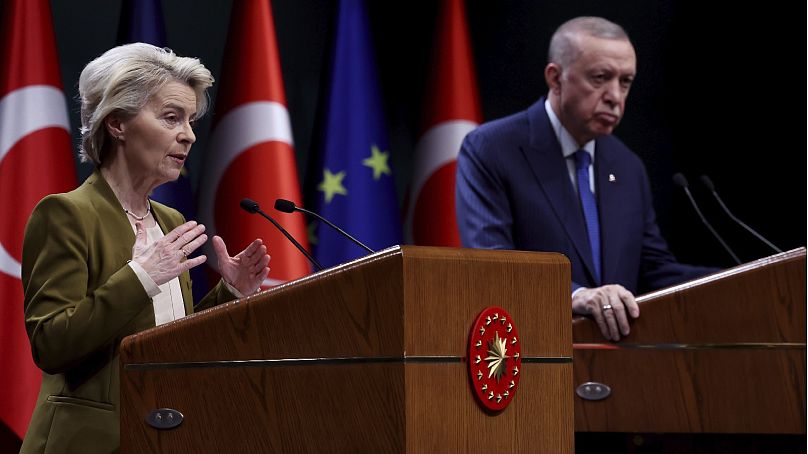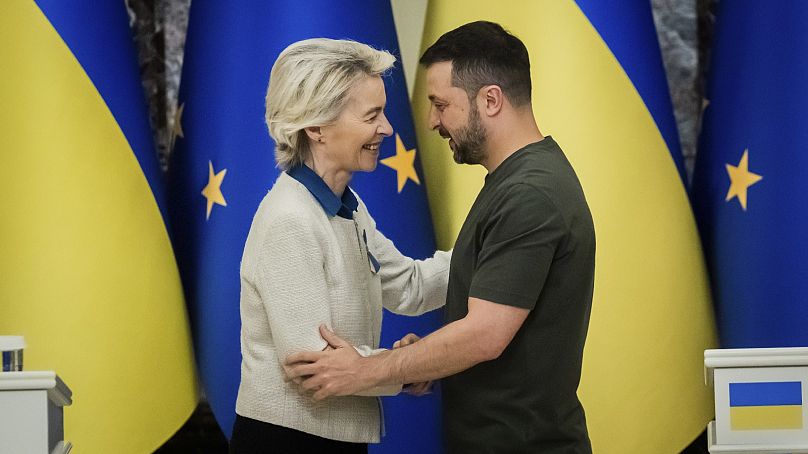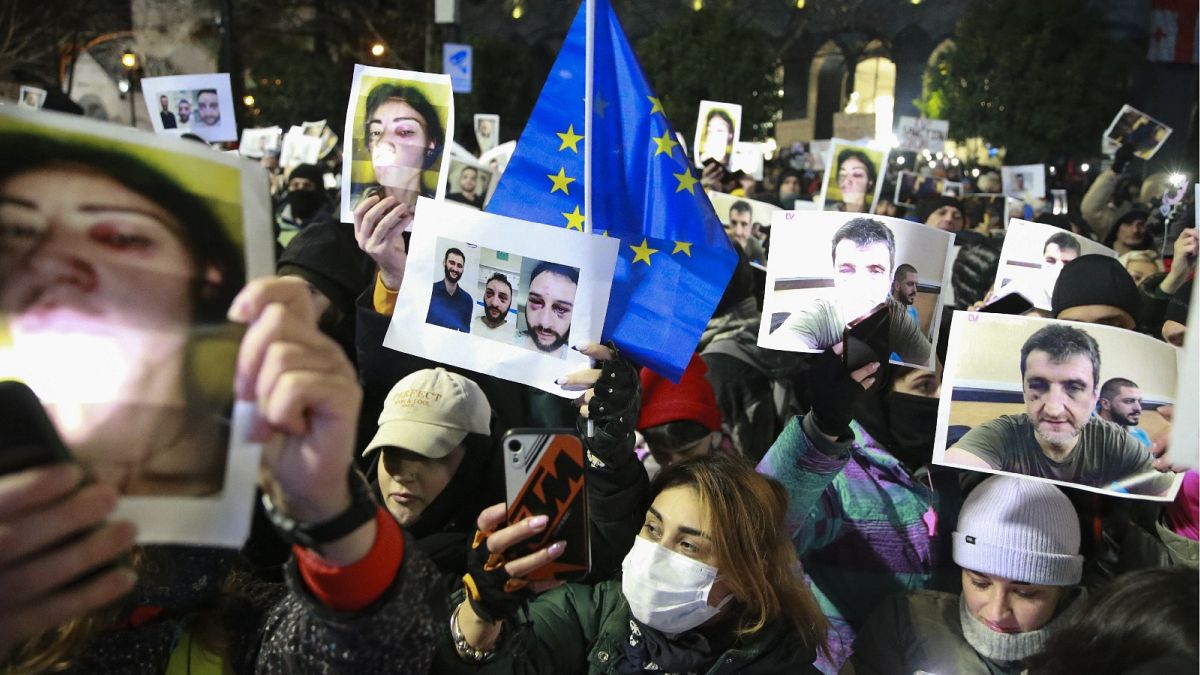Georgia and Turkey on Tuesday received stinging report cards from European Union ministers over their accession process, while Ukraine and Moldova mostly got gold stars.
In enlargement conclusions released as they were meeting in Brussels, EU affairs ministers largely excoriated Turkey and Georgia for democratic backsliding, noting only very limited progress towards European integration.
The bad pupils
The only positive development ministers flagged on Georgia pertained to the economy where they noted “the moderate level of preparation and limited progress in developing a functioning market economy”. They also commended the implementation of “sound fiscal and monetary policies”.
But every other paragraph dedicated to the country in the 36-page long document is negative, flagging the EU’s concern “regarding the course of action” taken by the government such as the so-called foreign agent law which they say runs counter to EU values.
Ministers described themselves as “deeply concerned about backsliding in the areas of democracy, rule of law and fundamental rights”, as well as in the functioning of the judiciary and institutional independence. Georgia’s overall failure to align with the EU’s foreign policy and restrictive measures, including against Russia and Belarus, was another point of concern for ministers.
They also “strongly” condemned the recent violence against peaceful protesters, media representatives, opposition politicians, and civil society, calling for it to “cease”.
Nightly protests have been taking place across Georgia for nearly three weeks after Prime Minister Irakli Kobakhidze unilaterally announced in late November the suspension of EU membership talks until 2028.
Opposition figures and hundreds of peaceful protesters have been detained, with multiple injuries also reported. The violent crackdown has led to calls for EU sanctions, which were on Monday vetoed by Hungary and Slovakia.
“The Council calls on the Georgian authorities to urgently revert to the EU path and adopt democratic, comprehensive and sustainable reforms, in line with the core principles of European integration,” ministers wrote.

Turkey scored a couple more good points, notably over improved relations with Greece and the resumption of high-level sectoral dialogue with the EU in areas of joint interest such as trade and the economy.
“A shift towards more conventional and tighter economic policies since mid-2023” was welcomed by ministers as were the “concrete measures” the country has taken to stop the circumvention of EU sanctions against Russia through its territory.
But the negatives massively outweigh the positives.
Among the sore points is Turkey’s troubled relationship with Cyprus, an EU member state, with ministers urging Ankara to normalise relations with Nicosia and respect its sovereignty and territorial integrity in accordance with international law – Turkey is the only country in the world that recognises the sovereignty of the northeast portion of the island of Cyprus.
“The continued and deeply worrying situation in the areas of democracy, rule of law and fundamental rights” was also underlined, especially the “systemic lack of independence and undue pressure on the judiciary, and the many restrictions on free and safe expression, including media freedom and dissemination of information”.
The country’s “very low alignment rate” with the bloc’s Common Foreign and Security Policy and sanctions against Russia were also flagged “as of utmost priority.”
“The Council notes that Türkiye’s accession negotiations have effectively come to a standstill and that no further chapters can be considered for opening or closing,” ministers wrote.
Turkish President Recep Tayyip Erdoğan however called on Tuesday following a meeting with European Commission chief Ursula von der Leyen for a tangible and immediate improvement in relations between the two sides. Among his demands to EU leaders were the lifting of “all restrictions” in bilateral relations, and the resumption of high-level political dialogue (suspended since 2019).
The good pupils
In contrast, EU ministers were a lot more glowing about Ukraine, noting the “considerable reform progress” made over the past year as the country defends itself against the Russian invasion.
They highlighted the good progress made in areas including the rule of law, judicial and public administration reform, judicial governance bodies, and the effective functioning of anti-corruption institutions.
They welcomed the “legislative and institutional framework on fundamental rights” and encouraged Ukraine to keep up work to strengthen freedom of expression and media plurality and independence.
Finally, Ukraine’s “high” alignment with the bloc’s foreign policy and sanctions was cheered.

The latter was also a strong point in Moldova’s favour, with ministers writing that it represents “a strong signal of Moldova’s strategic commitment to its EU path”.
The Council also “positively” noted Moldova’s continued efforts to strengthen its public administration and public finance management framework and called for continued reform progress in areas of the rule of law and fundamental rights, especially over the fight against corruption.
“The Council welcomes Moldova’s systemic approach to de-oligarchisation and encourages the continued implementation of the related action plan,” ministers added.
The rest of the class
Among the other candidate countries that also fared well were Albania, Montenegro and North Macedonia.
The first two both held accession conferences in Brussels this week, a sign the momentum towards accession is positive. In Montenegro’s case, the meeting on Monday allowed for the provisional closing of three chapters, while the ministerial conference with Albania served to open two new chapters of negotiations (on external relations and on foreign, security and defence policy).
Albanian Prime Minister Edi Rama told reporters after attending the meeting in Brussels on Tuesday that Tirana “want(s) to make sure that all our homework is done and our negotiations are concluded by 2027.”
“And hopefully, our membership is concluded within this decade,” he added.
North Macedonia was meanwhile commended for its continued good cooperation on migration management, border management, the good level of preparation and progress made towards developing a functioning market economy, and its “consistent cooperation” on foreign policy issues. Ministers, in particular, highlighted its “steadfast and long-standing full alignment” with the bloc’s foreign policy and sanctions.
But ministers also noted that Skopje has yet to complete the constitutional changes it agreed to about the recognition of the country’s Bulgarian minority, without which no further intergovernmental conference can be held.
They also flagged that “limited progress” had been made in the areas of the fundamentals and the rule of law and said they are “seriously concerned” about amendments to the Criminal Code.
Tensions across ethnic groups in Bosnia & Herzegovina as well as in Serbia and Kosovo were meanwhile among the areas of concern for ministers, who called for the various parties to de-escalate and resume talks urgently. They reiterated that progress in the EU accession process is dependent on the normalisation of relations.
All three EU aspirants were largely patted on the back for economic reforms, with Kosovo and Bosnia & Herzegovina also commended for their alignment with EU foreign policy and sanctions.
But Serbia was castigated for lack of progress on improving freedom of expression and the independence of the media as well as limited progress on the judiciary and the fight against organised crime.
Ministers called on Belgrade to “demonstrate more political will by further accelerating reforms and delivering concrete and tangible results on the fundamentals” and reiterated their “strong expectation” for Serbia “to step up its efforts towards full alignment” with the bloc’s foreign policy.
“The Council also calls on Serbian authorities to refrain from actions and statements against the EU positions on foreign policy and other strategic matters,” they wrote.
Heads of state from the Western Balkans and the EU are scheduled to meet for a summit on Wednesday evening in Brussels. EU leaders are then expected to adopt the ministers’ conclusions on enlargement at a one-day summit on Thursday.

